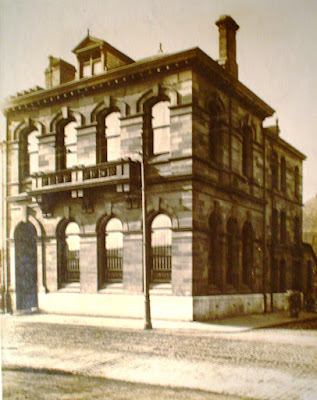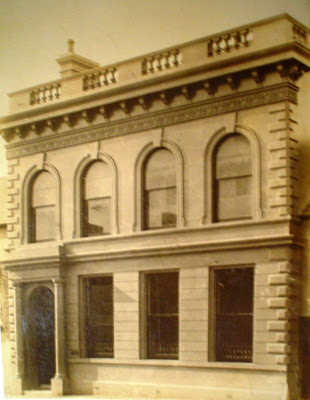Robert (Bobby) Campbell Malseed
Malseed was born in 1922 to Henry Malseed and Frances Louisa E (?) Victoria Malseed nee Marks. They had married at 5 Deramore Drive, Belfast (brides home) on 12th October 1920.
Henry Malseed was a Belfast bank official and a Great War veteran.
Malseed was educated at Portora Royal and Belfast Royal Academy schools.
He joined the Belfast Banking Company in May 1940 and started in Larne branch. His father, Henry signed the Bankers Guarantee giving his address as Belfast Bank, Belfast and later Portrush Road, Portstewart.
In 1941 Malseed volunteered and enlisted into the North Irish Horse regiment with Service Number 7905067. He saw action in North Africa and Italy.
Malseed wrote about his army service and his return to civvy life in an article for the bank staff magazine. It is reproduced below.
Following demobilisation in 1946, he returned to work in Markets branch.
Belfast Bank, Markets branch
Malseed was a member of the Belfast Banking Company Sports Club in March 1947 paying 5 shillings subscription.
He also served in Magherafelt (1947), Ballymoney (1967 - Manager), Coleraine (1969 - Manager), Londonderry (1973 - Manager) and Lurgan (1979 - Manager) branches.
A profile and picture was published in the staff magazine ‘The Link’ (Summer 1979).
A rugby picture of Malseed was published in the staff magazine ‘The Link’ (Summer 1982).
Malseed retired on 30th April 1985 with a picture being published in the staff magazine ‘The Link’ (Summer 1985).
Mrs L V Malseed, the widow of R C Malseed attended the 2000 re-dedication ceremony of the Rolls of Honour.
1940 and All That by Bobby Malseed (7905067)
The following article appeared in the Staff Magazine, The Link (Winter 1985).
It all started in 1936 or so when my generation, who were brought up on the old saying that the sun never sets on the British Empire and saluting the flag on Empire Day, had only two thoughts in mind, i.e. get a job and then join up if war came.
I joined the Bank in May 1940 just before Dunkirk and after six months of dipped pens, passing irregular endorsements on cheques, failing to copy letters correctly and losing the National Insurance Cards I heard the call of King and Country very clearly.
New Year’s Eve was spent behind a desk writing up Pass Books. With the pile of books growing higher and the singing of the soldiers outside getting louder as they welcomed in the New Year I knew my place was with them.
After five years of hostilities I spent a final year in the Army of Occupation in Germany where there was a thriving Black Market with twenty cigarettes fetching 100 Marks and a bottle of Scotch costing 17 Marks. A good life was had by all. (The immorality was deplorable).
At this stage it is only right to mention that during our service in the Forces the Officials at home were kind enough to subscribe to a Tobacco Fund organised by the late Hubert McManus (Hugh’s father) and I think we got 500 cigarettes per month and, believe me, they were very welcome. We never thought as we practically ate them in the tank that smoking was bad for our health and there were many other things around at that time that should surely have had a Government Health Warning. I remember going on leave from Italy and leaving instructions that my cigarette parcel was to be opened and shared leaving me 100 for myself – when I returned I was very surprised to see a lady whose character reference would surely be ‘trustworthy for any business engagement she would be likely to enter into’ smoking Gallaher Greens.
On return to Markets Branch in October 1946 dressed in my demob suit (which everybody was given on demobilisation) it was difficult to adjust to the new life.
You can imagine my predicament at 24 years of age just about being able to differentiate between a lodgement docket (white) and a cheque (pink) with the stale joke in my mind regarding the accountant who had a note on his desk about the Credit side being next the window which never struck me as being very funny as it was too near home for me.
However, the staff were all very kind to me and took great patience to explain many times how to do my daily tasks.
There were Welcome Home parties given by the churches and I will always remember Malone Rugby Club’s Welcome Home Dinner held in Thompson’s Restaurant where we received free Guinness which was very important to us in those days when ‘little things meant such a lot’. We also had our own annual Ex-Service Dinner which was very much enjoyed and, strangely enough, those “informal” occasions did not appear to affect our careers. I think that when we came home everybody hoped that we would blend into Society as soon and as painlessly as possible.
As most of us are now well over 60 the meaning of ‘they shall grow not old as we that are left grow old’ becomes much more vivid. Those of us who parade on Armistice Sunday look round at our grey-haired comrades and think of how smart they once looked in the various uniforms and how the great bond of understanding and friendship has blossomed over the years between us and a great feeling of thankfulness to be alive is always prevalent.












Bobby Malseed was one of the nicest bank managers you could meet. He was not a 'push over' for customers as he was also a very shrewd banker. I got to know him well as a result of management and lending courses we both attended and I found him to be very supportive of bank policy. He served in the North Irish Horse - a tankey outfit that swanned about the battlefield while the PBI had to slog it on foot. His few tales of his experiences were invariably laced with humour. I had a great lot of time for Bobby.
ReplyDeleteDavid, thank you for your very interesting story on Bobby Malseed.
DeleteI think he's part of the Malseed Family from Londondery.
ReplyDeleteWorked with Bobby in 1957 -1961 in Magherafelt Branch of Belfast Bank It was a happy time for me and he was a great colleague I left to get married (ladies not allowed to work when married)changed times!!! Great memories of that time
ReplyDelete